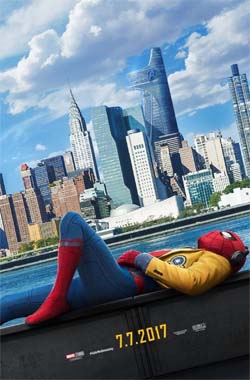
Spider-Man was a fairly revolutionary comic book character when he was first revealed back in the '60's. Being a nerdy, socially-awkward young teenager, a large portion of the comic-book-reading audience could relate to him in ways that they simply couldn't with characters like Batman, Superman, Iron Man, and the Fantastic Four. Peter Parker was one of them.
Finally casting an actual teenager to fill the role of Peter Parker / Spider-Man is an obviously brilliant (and overdue) move that does for this generation of young superhero movie audiences, what the original Spider-Man did for comic-reading kids in the '60's. For the first time, I can actually buy into this film version of Peter Parker as a high school student. There's a lot more focus on teenage drama and on Peter's conflicting responsibilities as Spider-Man and as a student. He flakes out on his friends, misses quizzes and extra-curricular activities. He worries about who he could invite to the homecoming dance, and worries that if Aunt May finds out about his superheroing, she might ground him.
Peter's age and his relatability to young audiences isn't the only parallel that this movie makes with the early issues of the comics. The first issue of Amazing Spider-Man included a storyline in which Spider-Man attempted to join the Fantastic Four. Homecoming is about Spider-Man seeking to join the Avengers (since Marvel doesn't have the film rights to the Fantastic Four yet). Homecoming skips over the first Spidey villain (who was the Chameleon) and focuses on the Vulture, who first appeared in Amazing Spider-Man #2. This movie also throws in the Tinkerer, who was also featured in a storyline of Amazing Spider-Man #2. The love interest is even fellow high-schooler Liz Allan, who even preceded Gwen Stacy as one of Peter's first romantic interests in the comics.
Trying to step out of Sam Raimi's spider-shadow
Much like the Sam Raimi movies, the supporting cast here is excellent -- and unlike the Sam Raimi movies, the main cast is spot-on too! Sure, it doesn't have J.K. Simmons as J. Jonah Jameson, and I have a hard time believing that anybody can beat Cliff Robertson and Rosemary Harris as Uncle Ben and Aunt May, but everyone here puts in a great effort. Robert Downey Jr.'s Tony Stark appearance is much more substantive than a simple phoned-in cameo, and Michael Keaton is absolutely fantastic as an increasingly-unhinged working-class bad guy who's simply trying to run his modest weapon-smuggling ring under the radar of the Avengers.
Instead of trying to join the Fantastic Four, Spider-Man is trying to join the Avengers.
I'm also grateful that this movie is a bit more upbeat and less mopey and brooding than the Sam Raimi films... [More]
25d77454-3032-4e32-ba44-0f5a2d5f87b3|0|.0
Tags:Spider-Man, Spider-Man: Homecoming, Sony, Columbia Pictures, Marvel Comics, Peter Parker, Adrian Toomes, vulture, tinkerer, shocker, Liz Allan, May Parker, Tony Stark, Iron Man, Avengers, Tom Holland, Michael Keaton, Robert Downey Jr., Zendaya, Jacob Batalon, Marisa Tomei
My past two blog posts have been focused on open world gaming. These posts have been continuations of an earlier post about the narrative "limbo" that many open world games create via their quest structures. In the first post in this second series, I pointed out what I perceive to be a problem with open world games that insist on turning their sandbox worlds into little more than convoluted mission-select screens and collectible checklists. In the following post, I described some games that I think managed to make successful open worlds by including features or mechanics that made traveling through the space (or knowledge of the space) into a meaningful mechanic. This time, I want to go back to some of the games that I singled-out in the first post in this series, and brainstorm some ways that they could have made better use of the large spaces that their maps offered so that traveling around the world wouldn't become so boring later in the game.
But before I do that, I want to re-emphasize that I don't hate these games. They're just not very good at using their space, and that's what I'm criticizing. Well, the newer Assassin's Creed games have been pretty terrible. Anyway, I pick on games like Skyrim and The Witcher III a lot, but I like them just fine - I bought the DLC for both. I pick on them, not because I hate them, but because I do like them and I want them to get better (or for their sequels to get better). Rather, my objective here is to find ways for these games to make better use of the large, open spaces that they provide the player, so that exploring the map feels more mechanically relevant, more interesting, or more rewarding; and to feel less like a time-sink.
Games like Skyrim and The Witcher III have massive worlds, but do a poor job of utilizing the space.
Bethesda's Skyrim and Fallout titles, as well as CD Projeckt Red's Witcher III and Rockstar's Grand Theft Auto V, already have open worlds that transcend being simple, convoluted mission-select screens like games like Assassin's Creed and Metal Gear Solid V. They populate their worlds with little narrative world-building details that make their worlds feel alive and lived-in (even though they may feel stagnant). So what could a game like Skyrim or The Witcher III have done to improve its open world? [More]
1a284324-86e6-4bf6-90a4-dca665c348d9|1|5.0
Tags:open world, sandbox, game design, road trip, map, traversal, travel, cartography, geography, narrative, ludonarrative, ludonarrative dissonance, limbo, paradox, Kafkaesque, quest, Ubisoft, Bethesda, Rockstar Games, Beenox, Insomniac Games, Naughty Dog, Assassin's Creed, The Elder Scrolls, Skyrim, The Witcher 3, Grand Theft Auto, Grand Theft Auto V, The Last of Us, Spider-Man, web-swinging, comic book
I wrote a lengthy blog late last year about the stagnant, "limbo"-like feel of most open world games' narratives. I had written that blog mostly before I played Metal Gear Solid V, and so I wasn't able to incorporate my thoughts regarding that game into the blog. But I did come to a new realization about open world gaming while I was playing MGSV. In my review of that game, I noted that:
"Even the open world itself feels constrained, as sheer cliffs prevent you from travelling too far off of the roads and serve to functionally railroad the player towards the small set-piece outposts and villages."
- from my Metal Gear Solid V: the Phantom Pain review
I realized while playing MGSV that the game had built this large, open world (well, two large, open worlds really, but I hadn't gotten that far yet), but it didn't really care to let the player actually traverse that space or use it in any meaningful way other than scavenger hunting for collectibles. At least those collectibles felt relevant to gameplay though! Roughly half the map is dead space that the player can't even access. There was also this strange focus on using the helicopter to drop in and drop out of missions, rather than actually living in the game world, as the character had to do in Snake Eater. The map started to feel less and less like a place, and more like a convoluted mission-select screen. At first, this seemed like a strange, isolated example of an open world game that really doesn't want the player actually exploring its world. But as I thought about it, I realized that this isn't really a new phenomenon; it's actually just a very extreme example of what has become a sort of defacto state in most open world games.
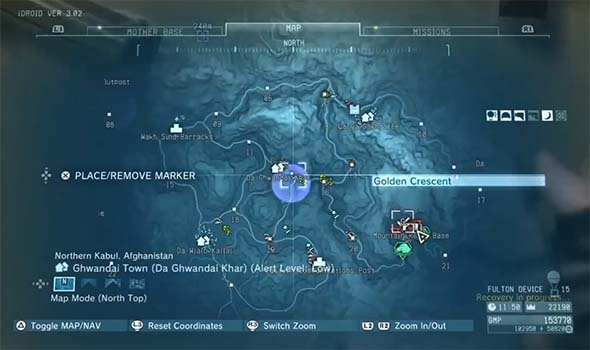
The Afghanistan map of Metal Gear Solid V feels heavily constrained by sheer cliffs.
Think about it this way: in a linear game with rooms and corridors, every hallway and room should serve some purpose or function. In most games, this function will be some kind of skill or system mastery test. An action game like Devil May Cry will throw enemies at you to fight; a puzzle game like Portal will have a puzzle (or a piece of a puzzle) in the room to solve; a stealth game like Metal Gear Solid 3 will have a sneaking challenge or obstacle to pass; and so on. In the best games, each of these challenges will also provide a unique or novel test of skill or system mastery: unique combinations of enemies, unique puzzles, or novel arrangements of enemies and obstacles. Other games can use those rooms for thematic or narrative purposes. A survival horror game like Resident Evil or Silent Hill will usually put enemies, puzzle items, or supplies in a room, but some rooms might instead contain a scripted scare. In some cases, a room might even be left completely empty in order to build some kind of tension or anticipation, or to delay the release of already-built tension or anticipation.
So what is the gameplay purpose of an open world map? ... [More]
d6e62cdb-b171-437a-b1a7-107859c9c818|4|4.5
Tags:open world, sandbox, game design, map, paradox, traversal, travel, cartography, geography, narrative, ludonarrative, ludonarrative dissonance, quest, exploration, driving, racing, vehicle, Ubisoft, Bethesda, Beenox, Metal Gear Solid V: the Phantom Pain, Assassin's Creed, the Amazing Spider-Man, Spider-Man, web-swinging, The Elder Scrolls, Skyrim, The Witcher 3, Fallout, Mad Max, Far Cry
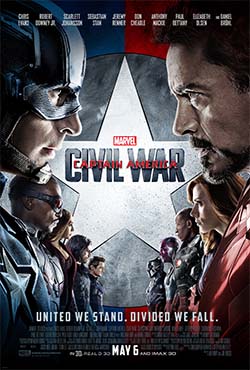
Why is this a "Captain America" movie? Why couldn't Marvel just call this "Avengers: Civil War" or "Marvel: Civil War"? This movie is just as much about Tony Stark as it is about Captain America, and the entire ensemble (minus a Hulk and plus a Spider-Man and Black Panther) is present.
Speaking of Spider-Man, let's get this out of the way right from the start. His presence felt like completely contrived fan service and the tonal shift that he brings kind of hurts the movie. He's pulled out of nowhere for no good reason so that he can participate in the big, fun battle royale; and then he's sent home when it's over and has absolutely no relevance to the movie's plot or themes. Tony Stark has no idea that Cap has recruited Ant Man, and I'm not even sure if he was aware that Hawkeye had broken Scarlet Witch out of the compound yet. Shouldn't Iron Man, War Machine, Black Widow, Black Panther, and Vision have been enough to take down Captain America, Falcon, and Bucky? Did he really think he needed to recruit an innocent, un-involved person and put him at risk?
That being said, this is the best combination of Spider-Man and Peter Parker that has been presented in live-action film to date. I do miss the New York accent of Andrew Garfield and the picture-perfect spider-suit from Amazing Spider-Man 2 (though I like the colors in Civil War better), and I think that the Sam Raimi films had the best supporting cast (outside of McGuire, Dunst, and Franco), but virtually everything about Civil War's Spider-Man was great.
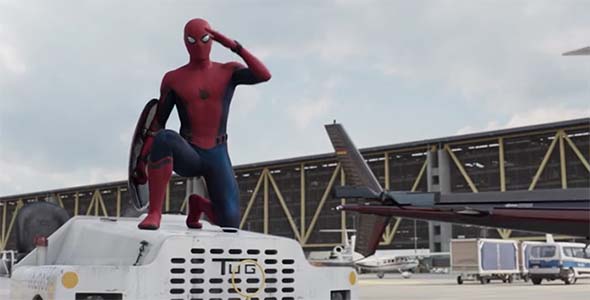
Despite the lack of a New York accent, this is probably the best film of portrayal of Peter Parker and Spider-Man.
Take my love, take my land, take me where I cannot stand
So how does the rest of the movie do?
It kind of reminds me of Serenity (the film follow-up to the series Firefly). Both the Firefly series and the preceeding Marvel films have all been very light-hearted, fun, and energetic. They've been full of charismatic, witty characters, genuine emotion, and exciting action. But Serenity and Civil War are much more brooding. The characters don't really get along, they all seem tired, there's less wit, and much of their charisma is lost. Even characters that we may have loved before now seem somewhat dull and might not be very fun to watch.
The action is still great, the characters are still fine, and there's still some humor and wit in the dialogue. But it feels like the soul that Marvel has built up for its universe has been sucked out. The darker themes of the plot aren't even necessarily the problem here. After all, I loved Winter Soldier (and really regret that I never wrote a review of it), and that movie had a darker edge to it. But it also deviated from the established formula and showed creativity and cleverness that the other Marvel movies didn't have. It felt more like a James Bond or Jason Bourne spy-thriller than the typical Marvel comic book movie, and that was great! Similarly, Ant Man (which I also regret not reviewing) felt more like a criminal heist movie, which was also great! Both felt unique enough that they transcended the tropes and McGuffins that they relied upon.

The characters have less energy and charisma about them.
Civil War, on the other hand, falls back on many of the formulaic tropes that the Marvel films were based on. It's another revenge and McGuffin plot. The McGuffin just happens to be a person this time around, and the entire second half of the movie could have been avoided if the characters would have just let each other talk. It's this formulaic model that conflicts with the dour tone and actually leads to large chunks of the movie actually feeling boring. And much like Age of Ultron before it, this movie feels a bit too bloated for its own good. I'd much rather have seen more screen time and development for Black Panther, and no Spider-Man at all... [More]
a7137a49-0a76-44a9-b31e-bd6d13e262d8|1|1.0
Tags:Captain America, Steve Rogers, Captain America: Civil War, Avengers, Marvel, Iron Man, Tony Stark, Bucky Barnes, Winter Soldier, Spider-Man, Peter Parker, Ant Man, Scarlet Witch, collateral damage, oversight, civilian casualties, Chris Evans, Robert Downey Jr., Batman Versus Superman: Dawn of Justice, Marvel Comics

After 2012's Amazing Spider-Man tie-in game presented some interesting ideas, I was really hoping that Beenox would have an opportunity to take the things they'd learned and apply them to a new, stand-alone Spider-Man game that would not be constrained to the plot and release schedule of a film tie-in. Sadly, that hasn't happened yet, and we have a new movie tie-in game that suffers from almost all of the problems associated with a movie tie-in.
Once again, Beenox was smart enough to know better than to follow along with the movie's asinine plot and opted to write their own side-story. Unfortunately, this one isn't as well written or as well presented as the previous game. It could have been a good story, but plot is clumsily-executed, and the associations to the movie only drag it down further.
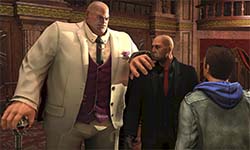
The Kingpin is comically (and ridiculously) oversized.
The bulk of the story is based around Wilson Fisk (the Kingpin) using rising crime rates as an excuse to deploy his private anti-crime task force in New York city. His company partners with Oscorp (who supplies the task force with its tech), and sells the task force to the public as a way of stopping crime and ending the vigilante justice that has plagued the city. But secretly, the task force is really out to destroy rival crime bosses and give Kingpin a monopoly on New York's organized crime underworld.
There's another secondary plot about hunting down the serial killer Cletus Kasady, who is killing criminals. This plot is only barely tied to the Kingpin thread, but it takes center stage during a large chunk of the second act of the game, and almost seems to become the main story - almost as if the writers couldn't decide if they wanted the game to be about Kingpin or about Carnage.
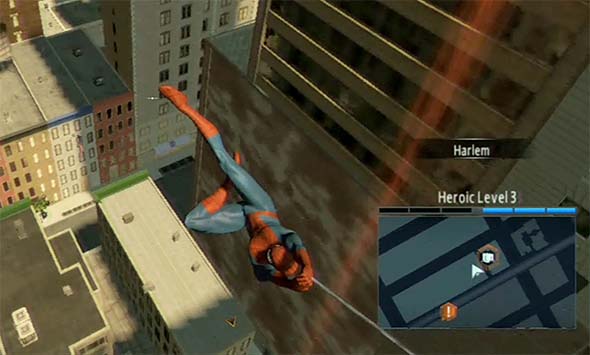
Web-swinging uses pseudo-physics that requires more active involvement from the player.
It's more rewarding than the prevoius game, but still not up to the level of earlier Spider-Man games.
Aside form a couple obligatory super villain boss fights with Electro and Green Goblin (Harry Osborn), the game has very little relation with the movie on which it is supposedly based... [More]
6f3d4582-799b-44ef-9867-65312fc53095|0|.0
Tags:The Amazing Spider-Man 2, Spider-Man, Kingpin, Electro, Green Goblin, Carnage, Shocker, Black Cat, open world, New York, Manhattan, web-swinging, Beenox, Activision, Steam, movie tie-in
|

| 12 | | | | | | | 60 | | 11 | | | | | | | 55 | | 10 | | | | | | | 50 | | 09 | | | | | | | 45 | | 08 | | | | | | | 40 | | 07 | | | | | | | 35 | | 06 | | | | | | | 30 | | 05 | | | | | | | 25 | | 04 | | | | | | | 20 | | 03 | | | | | | | 15 | | 02 | | | | | | | 10 | | 01 | | | | | | | 05 |
|